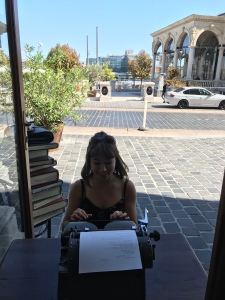Jacob Polley’s T S Eliot-prize-winning poetry collection Jackself is stunning.
And I mean that simply, in the first instance: its cover is gorgeous, its height spot on, and its width (it’s more square than most books) makes it feel quite luxurious to hold and peep into. Peep, that is, if you’re anything like me, terrified of bending the cover or spine of such a treasured item.
This isn’t the best way to start a review, and it probably sounds a little air-headed so far. But, firstly, as it sits beside me in all its minimalist glory, I can’t help but pitch its aesthetic appeal to you.
Secondly, the value of thick, smooth paper, rich black text, and roomy, spaced-out pages are all part of the process of reading, engaging, immersing yourself, and shouldn’t be underestimated.
And thirdly, I’m really not quite sure where else to start.
I was going to say that I was blown away by this collection – but let me rather say that I was enticed and captivated by it, that the tingle of its off-beat narrative was exciting and intriguing, that its atmospheric, enchanting language was teasing and stirringly impressive – because the occasion requires something more than a dead metaphor, something a little more, well, poetic.
Because Jacob Polley’s manipulation of language is off the scale of ingenuity and brilliance. Daring language tricks like ‘sunbeams fizz’ and ‘mouldy silence’ are not scattered or littered – that would be too careless – but woven seamlessly, intricately and frequently through the collection.
This gives Jackself oomph, a distinctive and fascinating voice, a continually surprising and impressive originality; its turns of phrase and enterprising expression help to build, shape and solidify the wacky, fictional, but recognisable world in which its action plays out and its characters are observed.
In The Misery, for example, my favourite from the collection, we’re given much more than an extended metaphor of misery as a grotesque bog monster. We have a face which is ‘sorrow-bright’, a pond which ‘blinks’, a ‘mothy glow’, a ‘deep blue / indifference’ which is ‘dislodged in a slump like a snow crest’. We have ‘cold fuming from the leaf-mulch on the floor’, a monster who is ‘laired’ and ‘loved like a motorway / service station litterbin’; I could quote the whole poem, because almost every line has an example of bright, witty language innovation.
The striking contrast between the ‘floors ankle-deep / in silver dust’, and ‘the skeletons of past Selves’ in The Lofts, and the world ‘written / backwards’, ‘the cartilage stew and spreadable carrots’ and ‘the sugar-paper sheet / of wobbly noughts’ of the schoolroom world in Lessons (two poems found side-by-side) exemplifies the collection’s constant shifting between the sinister and the playful, the duality of its youthful yet morbid humour.
In that sense, it is able to capture a childhood, its characteristic fears, wonderings, and peculiar logic, whilst exploring, through its developing narrative, increasingly adult themes and questions.
It holds realism and fantasy in simultaneous suspension, capturing feelings and situations which, whether laughable or pitiable, are relatable and recognisable in their warped way, though we’re often asked to draw the line ourselves between real action and Jackself’s (the protagonist) imaginative mental wanderings.
Though often abstract, quirky and disturbing, it is fundamentally grounded in realistic events, often communicated with an authentic coarseness, and the ambiguity as to where the fantasy begins electrifies the poems, and left a questioning but impressed smile lingering on my lips at the end of most poems.
There remains much for me to explore within Jackself, but for now I’m content to appreciate it, at its simplest, as a surprisingly narratively compelling, and linguistically breath-taking read.
Check out my commentary on my favourite poem of the collection, The Misery.
Or read about the time I met the author.

2 Comments Add yours